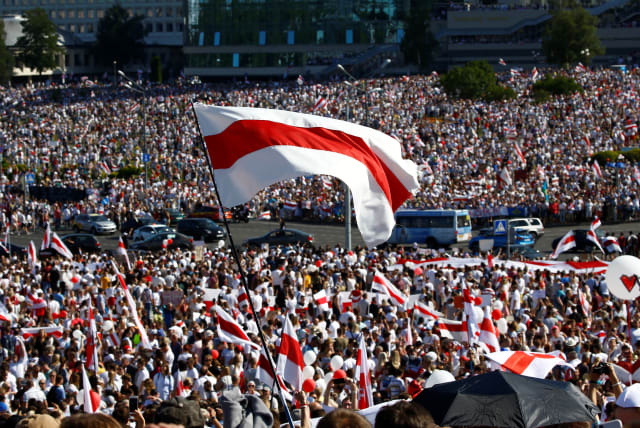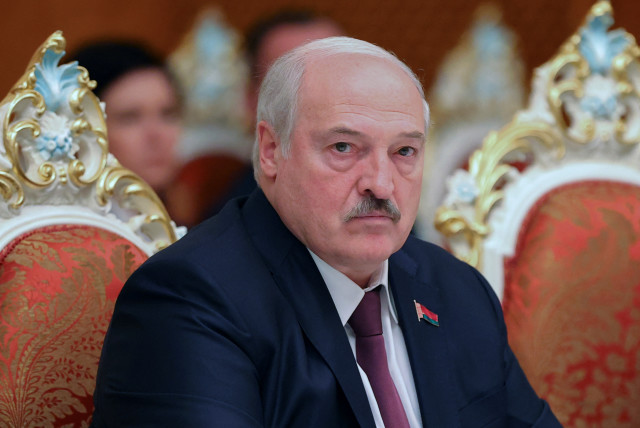Jewish cemetery in Belarus destroyed by Nazis, now being made into a memorial

The Nazis also destroyed the city’s Jewish cemetery in part by selling half of its headstones.
Earlier this year, the local Jewish community of Brest, Belarus, received a call from a young couple who had just purchased a fixer-upper house and needed some help with a difficult situation: Their basement was built from old Jewish gravestones.
For nearly two decades, the Jewish community — and in recent years, the nonprofit The Together Plan and its American arm, the Jewish Tapestry Project, founded to aid Belarusian Jewry — have been receiving such calls from residents of Brest who have collectively discovered thousands of Jewish headstones in their city’s construction. All of the headstones come from a historic cemetery that was destroyed during and after the Holocaust.
It has also photographed and catalogued 1,249 remnants of cemetery headstones, which were used after World War II in construction projects throughout the city. But by the end of next year, The Together Plan expects to complete a memorial to the cemetery. It is also in the process of organizing and cataloging more than 3,200 remnants of the cemetery’s headstones, which were used after World War II in construction projects throughout the city.
“Currently there’s nothing there to say it’s a cemetery,” Debra Brunner, CEO and co-founder of The Together Plan, the group leading the project, told CNN.
Before World War II, Brest — also known as Brest-Litovsk, or Brisk to the Jewish community that lived there — was home to more than 20,000 Jews and was a center of Jewish culture and study. But when the city was liberated after the Holocaust, only about 10 Jews remained there. Today, it has a total population of more than 300,000.
The Nazis initially cleared the headstones to make way for listening devices when they occupied Brest in 1941. Throughout the war, the headstones were used as pathways and construction materials. In some cases, the Hebrew lettering on the stones was chiseled away.
The memorial will be erected on what was once a corner of the cemetery, some distance away from the sports complex. It will be made from broken pieces of the headstones that have been recovered over the past two decades and will feature a black granite plaque with text in Russian, Hebrew and English. The area surrounding the memorial will be covered with trees, grass and wildflowers.
Jewish cemetery preservation has been at times a contentious issue in Belarus. As recently as 2017, a Belarusian court approved a plan to construct a luxury apartment building on top of a Jewish cemetery in the city of Gomel, near the country’s borders with Ukraine and Russia. The Brest municipality has pledged to maintain the upkeep of its city’s memorial but did not provide any funds directly to the project. It is being led by the Together Plan and the Jewish Tapestry Project and supported by the Religious Jewish Union of Belarus, the Illuminate Foundation and the charitable Belarus-based organization Dialog.
“Jews have always honored the memory of their ancestors,” Boris Bruk, chairman of the Orthodox Jewish community of Brest, said in a campaign video for the project. “And as there is no cemetery, we wanted to have a memorial sign, or a memorial place which would tell our descendants that their ancestors lie at this place, the people who lived, worked and prayed in this city.”
Efforts to return headstones
In 2004, residents, construction companies and homeowners with properties paved with headstones began making phone calls to Regina Simonenko, the head of the Brest Holocaust Foundation and museum, wanting to return them. In 2011, the municipality of Brest approved the construction of a memorial using the headstones. The Together Plan joined the project in 2014.
Apart from the 1,287 remnants with writing, another 2,000 to 2,500 smaller fragments, without any writing, have been collected and stored in a warehouse, where they have been photographed, cataloged and added to a searchable database.
The memorial is being designed by Dallas-based artist Brad Goldberg, who plans to build two arcs opposite each other that each feature some of the headstones. According to his website, Goldberg “sees his work as a fusion between sculpture, landscape, and the built environment.”
“It isn’t a cemetery,” he told CNN. “They are all facing in different directions as if they are having a conversation with each other.”
He added, “One rabbi that we have consulted has described it as being about life rather than about death.”
Goldberg has a connection to Brest, too, which led to his work on the memorial. His family had taken in a Holocaust survivor, the late Jack Grynberg, when Grynberg came to the United States following the war. Somewhere between 70 and 100 of Grynberg’s relatives were killed by the Nazis during the Holocaust. Grynberg was one of only a few Jewish residents of Brest to survive.
In 1997, Grynberg and his son Stephen traveled to Brest together. Stephen Grynberg is a filmmaker who has done work for the Shoah Foundation and was the one who recommended Goldberg as the memorial’s designer. The younger Grynberg is also donating towards the memorial’s estimated $325,000 cost.
“In 1997 there were no signs of the cemetery,” Stephen Grynberg told CNN. “We were taken there and our guide said, ‘This is where the cemetery was.’ Like so many things with the Holocaust, you can’t really understand them, you just have these complicated visceral feelings.”
He added, “I was just trying to compute the idea of them bulldozing a cemetery and building on it. That was the empty feeling I had.”
Jerusalem Post Store
`; document.getElementById("linkPremium").innerHTML = cont; var divWithLink = document.getElementById("premium-link"); if (divWithLink !== null && divWithLink !== 'undefined') { divWithLink.style.border = "solid 1px #cb0f3e"; divWithLink.style.textAlign = "center"; divWithLink.style.marginBottom = "15px"; divWithLink.style.marginTop = "15px"; divWithLink.style.width = "100%"; divWithLink.style.backgroundColor = "#122952"; divWithLink.style.color = "#ffffff"; divWithLink.style.lineHeight = "1.5"; } } (function (v, i) { });

